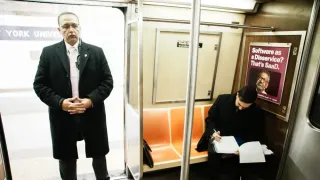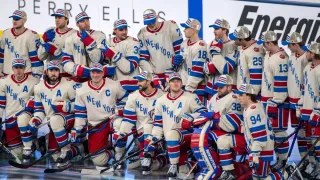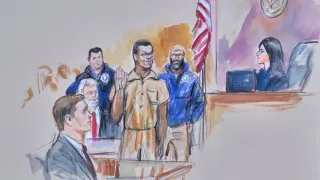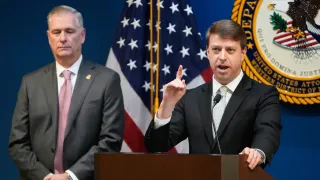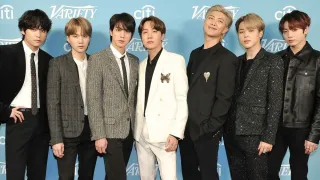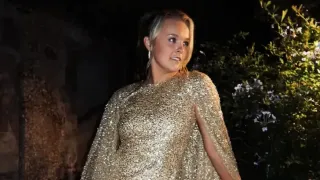June 30, 2022
Queer as Folk 3.0: Third Version of Popular Series Gets Diverse
Brian Bromberger READ TIME: 7 MIN.
With some reservations, we welcome back "Queer As Folk" in its third eight-episode incarnation, currently screening on Peacock. Russell T. Davies' 1999 groundbreaking British series about the lives of LGBTQ friends as chosen family flew over the pond and landed in its American Showtime cable version, which ran from 2000 to 2005.
In the press notes, the creator of this latest installment, Stephen Dunn ("Closet Monster") claims when he pitched his idea successfully to Russell T. Davies, "I told him that I didn't want to tell the same story he'd already done so well, but I wanted to create a new version that could break ground and reflect the next generation of queerness."
Dunn mostly adheres to this vision, but remnants of its two predecessors still pervade the storylines, though he incorporates more of the punk, badass, muddy, and sometimes venomous composition of the original British characters, so it feels wilder, freer, but also angrier. Dunn addresses social justice concerns, unlike Davies, who even avoided AIDS.
Dunn sets his queer community in New Orleans' Faubourg Marigny neighborhood. Tragedy strikes in the first episode with a shooting at the Babylon club (a holdover) in the style of the 2016 Pulse nightclub massacre. All this emphasis on hate crimes, targeted violence, and discrimination, seems sadly as pertinent as ever. To his credit, Dunn has recruited an almost entirely queer cast.
Family, connections
The central figure is Brodie (Devin Way), a commitment-phobic prodigal dropout from medical school, who comes home, but doesn't want to stay with his estranged biological family, which includes his martini-soaked, high-society-southern-debutant-with-trailer-park-roots mother Brenda (Kim Cattrall), his emotionally distant father Winston (Ed Begley, Jr.), and his pop-culture-nerd-with-cerebral-palsy gay brother Julian (Ryan O'Connell).
Brodie assumes he can move in with his ex-boyfriend Noah (Johnny Sibilly), and resume where they left off, but Noah has embarked on a secret relationship with Brodie's best friend Daddius (Chris Renfro).
Brodie wants to connect with his trans best friend Ruthie (Jessie James Keitel), who's adjusting to parenthood with her non-binary spouse Shar (CG) about to deliver twins, for whom he donated the sperm. Meanwhile the late twenty-something Brodie has a problematic ickyish hookup with the jaded 17-year-old high school student Mingus (Fin Argus), who's exploring their sexuality. With the blessings of his overly supportive mother Judy (Juliette Lewis), Mingus prepares to make their drag debut at Babylon on that fateful night.
At Babylon, we're introduced to Bussey (Armand Fields), the reigning drag queen and matriarch of the local scene, as well as Marvin (Eric Graise), a jaded barfly, sex-positive wheelchair user, and bilateral amputee.
In line with the previous series, "Queer As Folk" is chock-full of soap opera plots centered on romantic travails. Defiant hedonism in the form of excessive drug use and sex, skillfully photographed, includes many hot, erotic scenes with very little frontal nudity, suggesting you are seeing more than what is actually there. The show's chief virtue is that it has significantly more diversity in terms of race, gender fluidity, and sexual orientations than its previous incarnations, so issues of trans identity and intersectionality are broached.
The first episode introduces the main plot threads, but is unwieldy and overwhelming. The series really doesn't hit its stride until halfway, the season's peak Episode 4, entitled "Fck Disabled People," written by actor and executive producer O'Connell, who has cerebral palsy. It explores sexuality and disability through a resurrected Babylon club night called Ghost Fag, which hosts a "crip" sex party.
Julian's pairing with Noah is daring and promising. Marvin's exclamation, "Yes, I have a dick. And yes, it fucking works," finds fulfillment in a touching relationship with sex worker Ali (Sachin Bhatt), a topic rarely broached in television. Episode 7, which traces back Ruthie's and Brodie's friendship to their Catholic high school days and even bleeps out Ruthie's dead male name, is another highlight.
Underlying the run of the show is how it handles the massacre. Dunn has to walk a thin line between not wanting to exploit real trauma (there's nothing said about the shooter or his motives) but not have it overwhelm the action so it casts a pall. He opts to have the tragedy rear its ugly head only at selective moments, mostly as a rationale to explain bad behavior.
Overall, the series doesn't avoid the psychic wounds or the grief, but shows how the characters rebuild their lives in light of the shooting, not getting past the horror, but living with it.
The series is spot-on at satirizing benefit vigils and social media influencers who use the shooting to become the calamity's self-appointed public mourners to enhance themselves.
The show is never a downer or sad, and even in its darkest moments is funny. As Bussey says, in terms of a queer survival tool, "Trust me, it's a lot harder if you don't know how to laugh."
The series adeptly balances frivolity alongside pain. There's oppression and marginalization, but the focus is on how the characters overcome it by becoming fully who they are.
Flawed and Flawless
The series isn't afraid of portraying messy characters – flawed, selfish ones who make mistakes in their quest to find happiness, mirroring real life. However, the chief flaw of "Queer As Folk" is that its lead Brodie is an unlikable narcissistic jerk to the point of being grating. While there are hints towards the end that he may have some redeeming qualities, the minor revelations come a bit too late to alter one's initial negative impressions.
The disabled Julian and Marvin, along with the trans/non-binary actors, are the breakout stars of the show, with O'Connell having honed this theme in his landmark Netflix web series "Special." Cattrall (having wisely passed on the abysmal "Sex and the City" HBO Max reboot, "Just Like That," endures a surprising evolution in her character) and Lewis radiate in diva variations of Showtime's Sharon Gless role as the proud PFLAG-waving mother.
The series has received some criticism for being too entrenched in today's pluralist identity politics, a progressive woke fantasy of representing everyone, which strains credulity. Perhaps that is why we're ambivalent about this series.
Yes, every racial, gender, and sexual orientation box has been checked, but most of the characters, with the exception of the disabled ones, lack emotional warmth and come across as one-dimensional. There is some hope for future development as they aren't afraid to call out each other's selfishness, gripes, and BS. Consequently, we partially identify with them, precisely because they're not perfect role models.
So, does "Queer As Folk" deserve this reboot and a second season? We answer with an equivocal yes, provided more character depth is provided, especially relating to Brodie and Mingus. The LGBTQ world is now very different than it was in 2005, primarily with regards to marriage equality, but also a broader awareness of gender and sexual self-identity.
All these changes are reflected in the program's update, giving us a glimpse into what it's like to be young and queer in 2022. What succeeds in "Queer As Folk" is what's fresh and bold, which along with its joyful spirit, makes the series intermittently dynamic, illuminative, and gripping. We just need more audacious story arcs and more complex characters for whom we can root and eventually love.
https://www.peacocktv.com/dr/queer-as-folk
Help keep the Bay Area Reporter going in these tough times. To support local, independent, LGBTQ journalism, consider becoming a BAR member.
